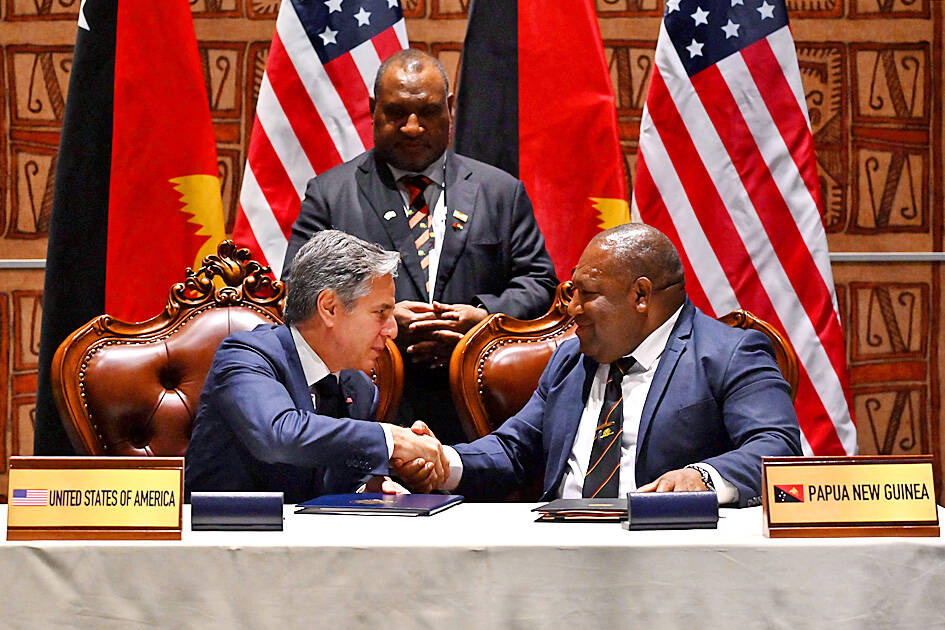The US military can develop and operate out of bases in Papua New Guinea, according to a landmark security pact that is part of Washington’s efforts to outflank China in the Pacific.
The full text of the deal was tabled in Papua New Guinea’s parliament on Wednesday evening and obtained by Agence France-Presse, shedding light on details that have been closely guarded since the pact was signed last month.
With Papua New Guinea’s agreement, the US would be able to station troops and vessels at six key ports and airports, including Lombrum Naval Base on Manus Island and facilities in the capital, Port Moresby.

Photo: AFP
Washington would have “unimpeded access” to the sites to “pre-position equipment, supplies and materiel,” and have “exclusive use” of some base zones, where development and “construction activities” could be carried out.
The agreement opens the door to Washington establishing a new military footprint in the western Pacific, at a time of growing rivalry with Beijing.
Access to Lombrum could be used to reinforce US facilities on Guam to the north, which could be key in the event of a conflict over Taiwan.
Papua New Guinean Prime Minister James Marape has been forced to defend the deal against a wave of protests and criticism, with some opponents questioning whether Papua New Guinea was signing away its sovereignty.
“We have allowed our military to be eroded in the last 48 years,” he told parliament on Wednesday evening. “Sovereignty is defined by the robustness and strength of your military.”
Washington is trying to woo Pacific nations with an array of diplomatic and financial incentives in return for strategic support, after similar moves by Beijing.
The Pacific island nation of Palau has asked the US to step up patrols of its waters after several incursions by Chinese vessels into its exclusive economic zone, Palauan President Surangel Whipps Jr told Reuters in an interview in Tokyo on Wednesday.
Whipps said he would also welcome a bigger US military presence in the country, with troops stationed alongside existing coast guard and civil action teams.
Additional reporting by Reuters

AIR SUPPORT: The Ministry of National Defense thanked the US for the delivery, adding that it was an indicator of the White House’s commitment to the Taiwan Relations Act Deputy Minister of National Defense Po Horng-huei (柏鴻輝) and Representative to the US Alexander Yui on Friday attended a delivery ceremony for the first of Taiwan’s long-awaited 66 F-16C/D Block 70 jets at a Lockheed Martin Corp factory in Greenville, South Carolina. “We are so proud to be the global home of the F-16 and to support Taiwan’s air defense capabilities,” US Representative William Timmons wrote on X, alongside a photograph of Taiwanese and US officials at the event. The F-16C/D Block 70 jets Taiwan ordered have the same capabilities as aircraft that had been upgraded to F-16Vs. The batch of Lockheed Martin

GRIDLOCK: The National Fire Agency’s Special Search and Rescue team is on standby to travel to the countries to help out with the rescue effort A powerful earthquake rocked Myanmar and neighboring Thailand yesterday, killing at least three people in Bangkok and burying dozens when a high-rise building under construction collapsed. Footage shared on social media from Myanmar’s second-largest city showed widespread destruction, raising fears that many were trapped under the rubble or killed. The magnitude 7.7 earthquake, with an epicenter near Mandalay in Myanmar, struck at midday and was followed by a strong magnitude 6.4 aftershock. The extent of death, injury and destruction — especially in Myanmar, which is embroiled in a civil war and where information is tightly controlled at the best of times —

Taiwan was ranked the fourth-safest country in the world with a score of 82.9, trailing only Andorra, the United Arab Emirates and Qatar in Numbeo’s Safety Index by Country report. Taiwan’s score improved by 0.1 points compared with last year’s mid-year report, which had Taiwan fourth with a score of 82.8. However, both scores were lower than in last year’s first review, when Taiwan scored 83.3, and are a long way from when Taiwan was named the second-safest country in the world in 2021, scoring 84.8. Taiwan ranked higher than Singapore in ninth with a score of 77.4 and Japan in 10th with

China's military today said it began joint army, navy and rocket force exercises around Taiwan to "serve as a stern warning and powerful deterrent against Taiwanese independence," calling President William Lai (賴清德) a "parasite." The exercises come after Lai called Beijing a "foreign hostile force" last month. More than 10 Chinese military ships approached close to Taiwan's 24 nautical mile (44.4km) contiguous zone this morning and Taiwan sent its own warships to respond, two senior Taiwanese officials said. Taiwan has not yet detected any live fire by the Chinese military so far, one of the officials said. The drills took place after US Secretary